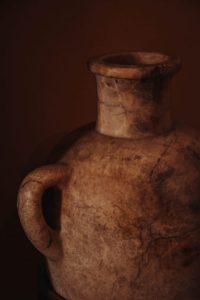I read recently of a couple in California who were out walking their dog when they spotted the side of a rusty can protruding out of a nearby hill. Their curiosity led them to dig out the old, dirty can and take it back home. When they opened the can, they discovered that it was stuffed with gold coins from the 1800s. Returning to the hill, they found several other cans that were also filled with gold coins. Their find was worth an estimated $10 million dollars in today’s market. Within the old, rusty can was found treasure of enormous value.
 In 2 Corinthians 4:7, Paul speaks of a treasure that we find in “earthen vessels.” He says “…we have this treasure in earthen vessels, that the excellency of the power may be of God, and not of us.” In this passage, Paul is making a comparison between the treasure of the Gospel and the container in which it is stored. When one thinks of the invaluable treasures contained in the Gospel message, one would expect God to store them in the strongest, the most valuable, and the most appealing vessels that He could find. But it is evident from this verse that God does just the opposite.
In 2 Corinthians 4:7, Paul speaks of a treasure that we find in “earthen vessels.” He says “…we have this treasure in earthen vessels, that the excellency of the power may be of God, and not of us.” In this passage, Paul is making a comparison between the treasure of the Gospel and the container in which it is stored. When one thinks of the invaluable treasures contained in the Gospel message, one would expect God to store them in the strongest, the most valuable, and the most appealing vessels that He could find. But it is evident from this verse that God does just the opposite.
In 2 Corinthians, Paul was having to defend his ministry from some false apostles who were influencing the Corinthian church. These people were saying that “his bodily presence was weak, and his speech contemptible” (2 Corinthians 10:10). Since they couldn’t attack his character, they attacked his physical weaknesses and the way he spoke. But instead of defending himself from their attacks, Paul decided to use this to establish his ministerial credibility. Paul knew he lacked persona, charm, and physical strength. He said, “…and I was with you in weakness, and in fear, and in much trembling. And my speech and my preaching was not with enticing words of man’s wisdom…” (1 Corinthians 2:3-4). Paul knew his own weakness and frailty as a man. He understood that he was not an eloquent orator. But Paul also realized that his physical weaknesses were exactly what God was using to bring glory to Himself.
Paul understood that he was just an “earthen vessel” (i.e., a clay pot). But packaged inside a fragile, weak, imperfect, unimpressive container was an invaluable treasure that God had put there. Paul realized that God doesn’t put His Gospel treasures in the strongest, most valuable, and most appealing containers; rather, God takes the treasures of the Gospel and puts them in weak, frail, and base containers.
All of God’s servants are “earthen vessels.” In ourselves, we are unimpressive, simple, easily broken, and frail. But God chooses to use the “base things of the world, and things which are despised” (1 Corinthians 1:28). Why? “That no flesh should glory in his presence” and that “the excellency of the power may be of God, and not of us” (1 Corinthians 1:29 & 2 Corinthians 4:7).
~Pastor Aaron Francis



